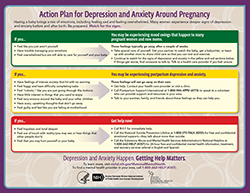Use this action plan to see if what you are feeling is depression and anxiety during pregnancy or after birth, and if you should seek help.
Note: This action plan is designed to help you understand the signs of depression and anxiety and to take steps to feel better. It is not meant to take the place of professional medical advice. If you are concerned about how you're feeling, talk with someone now.
Green - Action Plan
|
If you...
- Feel like you just aren't yourself
- Have trouble managing your emotions
- Feel overwhelmed but are still able to care for yourself and your baby
|
You may be experiencing mood swings that happen to many pregnant women and new moms.
These feelings typically go away after a couple of weeks.
- Take special care of yourself. Get your partner to watch the baby, get a babysitter, or team up with another mom to share child care so that you can rest and exercise.
- Continue to watch for the signs of depression and anxiety in the yellow and red sections below. If things get worse, find someone to talk to. Talk to a health care provider if you feel unsure.
|
Yellow - Action Plan
|
If you...
- Have feelings of intense anxiety that hit with no warning
- Feel foggy and have difficulty completing tasks
- Feel "robotic," like you are just going through the motions
- Have little interest in things you used to enjoy
- Feel very anxious around the baby and your other children
- Have scary, upsetting thoughts that don't go away
- Feel guilty and feel like you are failing at motherhood
|
You may be experiencing postpartum depression and anxiety
These feelings will not go away on their own.
- Get help. Contact your health care provider or visit a clinic.
- Call Postpartum Support International at 1-800-944-4PPD (4773) to speak to a volunteer who can provide support and resources in your area.
- Talk to your partner, family, and friends about these feeling so they can help you.
|
Red - Action Plan
|
If you...
- Feel hopeless and total despair
- Feel out of touch with reality (you may see or hear things other people don't)
- Feel that you may hurt yourself or your baby
|
Get help now!
- Call 9-1-1 for immediate help.
- Call the National Suicide Prevention Lifeline at 1-800-273-TALK (8255) for free and confidential emotional support - they don't just talk about suicide.
- Call the Substance Abuse and Mental Health Services Administration Treatment Locator at 1-800-662-HELP (4357) to find a mental health provider in your area.
|
Download a printable version of the action plan for yourself, a family member, friend, or patient.

Download or view the Action Plan (PDF 215 KB)
Other Program Initiatives
Learn why a pregnancy is now considered "full term" at
39 weeks.





 BACK TO TOP
BACK TO TOP